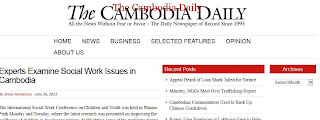
A short item in an American daily covering Cambodia covers an international social work conference there. As with a lot of the rest of the wold, there is concern about the government not really knowing about social work, and therefore not organising services appropriately.
Tracy Harachi, a university of Washington academic who is working on developing training there, comments:
“Social workers should not just operate within the department of social
affairs, they need to be integrated across various government
departments such as health and education…but [the government] hasn’t yet
understood that social work needs to interact in this way,” Ms. Harachi
said.
And in that she's raising a universal issue for social work, which has swung backwards and forwards in the UK, too. Should you be scattered as a secondary interest across all the services, such as housing, health and education, where good social work could make a contribution? Or should you be concentrated in one place, where you can get professional support and a political base for influencing other services?
There's no simple answer to this issue. When I came into social work,the UK was losing its separate specialist services and being accumulated into one social services department in local government seemed like final recognition for the profession and its value. But now we've been reorganised into separate children and adult services, with the advantage of focus. The medical profession often complains that they can't get the social services for their patients that they want (sometimes because they want too much control from a medical point of view) and that services cannot be coordinated between health and social care. Yet integrated into healthcare services, it requires a strong social worker to command respect and support from medical and nursing colleagues whose eyes are mainly on other priorities and who find social work puzzlingly concerned with social relations rather than getting them the resources they want for their patients.
The reality is that social workers will never be in quite the right place. But we need to work on social cohesion whatever the priorities of everyone else.
Link to Cambodia Daily article














